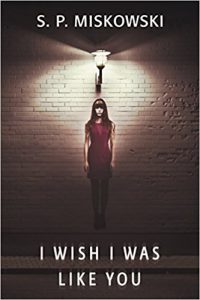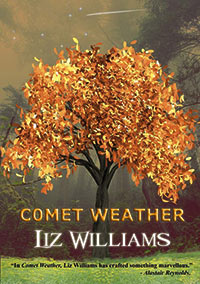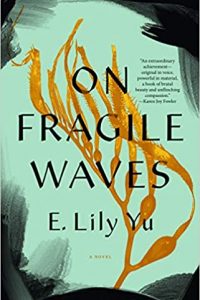Alexandra Pierce Reviews Immortal Longings by Chloe Gong
 Immortal Longings, Chloe Gong (Saga 978-1-66800-022-9, $28.99, 384pp, hc) June 2023.
Immortal Longings, Chloe Gong (Saga 978-1-66800-022-9, $28.99, 384pp, hc) June 2023.
Chloe Gong had me at ‘‘inspired by Antony and Cleopatra.’’ Specifically, Shakespeare’s Antony and Cleopatra. Then she set it in a city inspired by the Kowloon Walled City, and added people who can jump between bodies. It’s a lot and it’s amazing.
The novel opens with August Shenzhi, adopted son of King Kasa, looking out over San-Er – the city to which he is heir. Originally and officially twin cities, San-Er is now under one monarch, since Princess Calla slaughtered her parents, who had been co-rulers with Kasa. While August gives readers a view from inside the palace throughout the novel, the action centers on Calla Tuoleimi and Anton Makusa: both originally palace brats, both now living as exiles in San-Er proper and trying as best they can to survive on their wits. And both, for reasons of their own, entered into the lottery to participate in the upcoming games. These games give eighty-eight citizens a chance to win a life-changing amount of money, and all they have to do is be the last one alive at the end. Anton needs the money for medical bills; Calla needs the opportunity to get near King Kasa because it’s the only chance she’ll ever have to kill him.
Fundamentally, the story follows Anton and Calla as they fight their way through the games: meeting and forming a wary alliance, being dimly aware of various conspiracies and troubles around them. If there were minimal worldbuilding that would still be an interesting enough story. Gong, however, does not just leave it there. Rather, she has created a rich and compelling world that means I’m excited that this is the first book in a trilogy.
San-Er as a city is a mash up of a modern city, ancient Rome, and the Kowloon Walled City. Modernity comes in the existence of the internet (although not many people have home computers yet), surveillance cameras, and indoor plumbing; it’s Rome with its apartment buildings, Colosseum, street food, and being the political center of an empire. The Kowloon Walled City is also present in the apartment buildings, and the sheer density of the city: Gong speaks of it being ‘‘the densest city in the world’’ at one time, in her comments at the end of the book. As well, a central discussion in the book is around the presence and use of a person’s qi, drawing in traditional Chinese concepts.
Whatever the inspiration, San-Er is a dysfunctional city: people die of hunger all the time, health care is only for those who can afford it, there are no building regulations, there’s a criminal society with enormous power, and entry to and exit from the city are highly regulated. Where Rome as a city famously kept its population under control through bread and circuses, San-Er doesn’t bother with the bread side; it’s just the entertainment of the annual games that King Kasa uses to give people hope, and an outlet. San-Er takes from its surrounding provinces and gives little back; it is a rotten system, but few can imagine an alternative.
Then there’s the callbacks. For my fellow Roman history nerds, San-Er’s games are clearly a riff on the gladiatorial games, while mention of a previous victor in the games who tried to raise an army to invade the city is presumably a reference to Spartacus. The Roman history and Shakespeare nerds may enjoy spotting various characters: Pampi Magnes (Pompey Magnus), for example, and Calla’s attendants Chami and Yilas (Charmion and Iras). Gong has also incorporated the occasional quote from Shakespeare’s play.
All of these aspects made me enjoy the novel, and I haven’t got to the body-jumping yet. A person with the right genes can send their qi into another body, and inhabit it for however long they like; the original qi is unable to fight back. This makes solving crimes difficult – are you responsible for what your body did when you were invaded? How can that be proved after the fact? – and presents problems of identity theft. It also raises questions around identity itself, leading to considerations that will be familiar to fans of Richard K. Morgan’s Altered Carbon. The only characteristic that follows you is the color of your eyes: if you have red eyes and jump into a black-eyed body, it’s a giveaway. This ability is central to the narrative, both because characters must grapple with truly knowing their friends and allies, and because Calla refuses to jump.
This is Gong’s first novel for adults. She has previously written two YA duologies, based on Romeo and Juliet (These Violent Delights, 2020 and 2021) and As You Like It (Foul Lady Fortune, 2022 and 2023). Clearly, she has a penchant for Shakespeare. If she makes her stories as new and as riveting as Immortal Longings, I’m all for it.
Alexandra Pierce reads, writes, podcasts, cooks and knits; she’s Australian and a feminist. She was a host of the Hugo Award winning podcast Galactic Suburbia for a decade; her new podcast is all about indie bookshops and is called Paper Defiance. Alex has edited two award-winning non-fiction anthologies, Letters to Tiptree and Luminscent Threads: Connections to Octavia E Butler. She reviews a wide range of books at www.randomalex.net.
This review and more like it in the August 2023 issue of Locus.
 While you are here, please take a moment to support Locus with a one-time or recurring donation. We rely on reader donations to keep the magazine and site going, and would like to keep the site paywall free, but WE NEED YOUR FINANCIAL SUPPORT to continue quality coverage of the science fiction and fantasy field.
While you are here, please take a moment to support Locus with a one-time or recurring donation. We rely on reader donations to keep the magazine and site going, and would like to keep the site paywall free, but WE NEED YOUR FINANCIAL SUPPORT to continue quality coverage of the science fiction and fantasy field.
©Locus Magazine. Copyrighted material may not be republished without permission of LSFF.






